FUEL FOR THOUGHT
Page 58
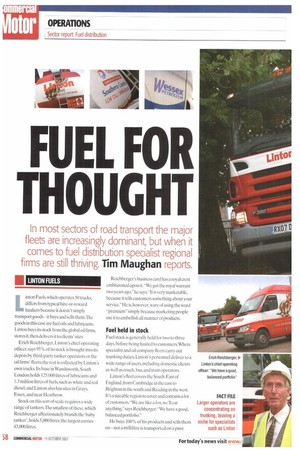
Page 59
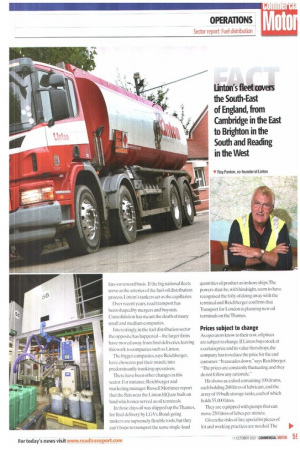
Page 60
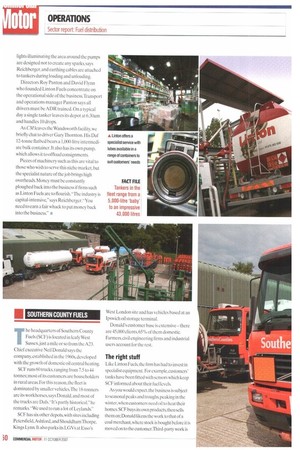
Page 61
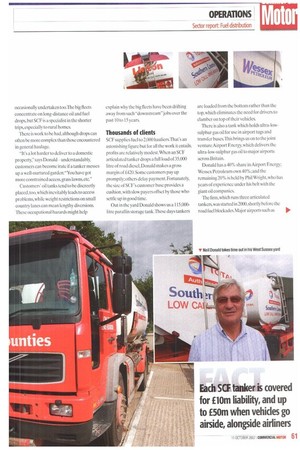
Page 62
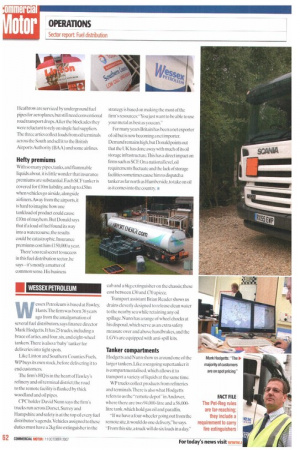
Page 63
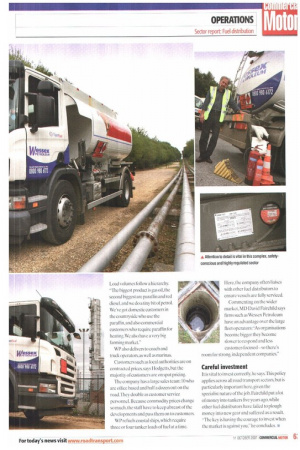
If you've noticed an error in this article please click here to report it so we can fix it.
In most sectors of road transport the major fleets are increasingly dominant, but when it comes to fuel distribution specialist regional firms are still thriving. Tim Maughan reports.
LINTON FUELS Linton Fuels, which operates 50 trucks, differs from typical hire-or-reward hauliers because it doesn't simply transport goodsit buys and sells them.The goods in this case are fuel oils and lubricants. Linton buys its stock from the global oil firms, stores it, then delivers it to clients' sites.
Erich Reichberger, Linton's chief operating officer, says 95% of its stock is brought into its depots by third-party tanker operators or the oil firms' fleets: the rest is collected by Linton's own trucks.lts base in Wandsworth, South London holds 125,000 litres of lubricants and 1.3 million litres of fuels, such as white and red diesel, and Linton also has sites in Grays, Essex, and near Heathrow.
Stock on this sort of scale requires a wide range of tankers. The smallest of these, which Reichberger affectionately brands the 'baby tanker', holds 5,000 litres: the largest carries 43,000 litres. Reichberger's business card has a royal crest emblazoned upon it. "We got the royal warrant two years ago,he says."It is very marketable, because it tells customers something about your service." He is, however, wary of using the word "premium" simply because marketing people use it to embellish all manner of products.
Fuel held in stock Fuel stock is generally tick! tor two to three days, before being hauled to customers. Where specialist and oil company fleets carry out trunking duties, Linton's personnel deliver to a wide range of users, including domestic clients as well as coach, bus, and train operators.
Linton's fleet covers the South-East of England, from Cambridge in the east to Brighton in the south and Reading in the west. It's a sizeable region to cover and contains a lot of customers.-We are like a fox, we'll eat anything," says Reichberger.-We have a good. balanced portfolio."
He buys 100% of his products and sells them on not a millilitre is transported on a pure hire-or-reward basis. lithe big national fleets serve as the arteries of the fuel-oil distribution process, Linton's tankers act as the capillaries.
Over recent years, road transport has been shaped by mergers and buyouts. Consolidation has meant the death of many small and medium companies.
Interestingly, in the fuel distribution sector the opposite has happened — the larger firms have moved away from final deliveries, leaving this work to companies such as Linton.
The bigger companies, says Reichberger, have chosen to put their muscle into predominantly trunking operations.
There have been other changes in this sector. For instance, Reich berger and marketing manager Russell Mortimer report that the flats near the Linton HQ are built on land which once served as oil terminals.
In those days oil was shipped up the Thames, for final delivery by LG Vs. Road-going tankers are supremely flexible tools, but they can't hope to transport the same single-load quantities of product as inshore ships.The powers-that-be, with hindsight,seem to have recognised the folly of doing away with the terminal and Reichberger confirms that Transport for London is planning new oil terminals on the Thames.
Prices subject to change As operators know to their cost, oil prices are subject to change. If Linton buys stock at a certain price and its value then drops, the company has to reduce the price for the end customer."It cascades down," says Reichberger. "The prices are constantly fluctuating, and they do not follow any rationale."
He shows us a shed containing 100 drums, each holding 208 litres oflubricant,and the array of 19 bulk storage tanks, each of which holds 55,0(X) litres.
They are equipped with pumps that can move 250 litres of tubes per minute.
Given the risks of fire, specialist pieces of kit and working practices are needed. The lights illuminating the area around the pumps are designed not to create any sparks, says Reichberger, and earthing cables are attached to tankers during loading and unloading.
Directors Roy Panton and David Flynn who founded Linton Fuels concentrate on the operational side of the business. Transport and operations manager Panton says all drivers must be A DR trained. On a typical day a single tanker leaves its depot at 6.30am and handles 10 drops.
As CM leaves the Wandsworth facility, we briefly chat to driver Gary Thornton. His Daf 12-tonne flatbed hears a 1,000-litre intermediate bulk container. It also has its own pump, which allows it to offload consignments.
Pieces of machinery such as this are vital to those who wish to serve this niche market, but the specialist nature of the job brings high overheads. Money must be constantly ploughed back into the business if firms such as Linton Fuels arc to flourish.-The industry is capital-intensive," says Reichberger."You need to earn a fair whack to put money back into the business."
SOUTHERN COUNTY FUELS ic headquarters of Southern County IFuels (SCF) is located in leafy West 1. Sussex, just a mile or so from the A23. Chief executive Neil Donald says the company, established in the 1960s.developed with the growth of domestic oil central heating.
SCF runs 60 trucks, ranging from 7.5 to 44 tonnes:most of its customers are householders in rural areas. For this reason,the fleet is dominated by smaller vehicles.The 18-tonners are its workhorses, says Donald, and most of the trucks are Dals."It's partly historical,he remarks."We used to run a lot of Leylands."
SCF has six other depots, with sites including Petcrsfield, Ashford, and Shouldham Thorpe, Kings Lynn. It also parks its LCiVs at Esso's West London site and has vehicles based at an Ipswich oil storage terminal.
Donald's customer base is extensive—there are 45,000 clients, 65% of them domestic. Farmers, civil engineering firms and industrial users account for the rest.
The right stuff Like Linton Fuels, the firm has had to invest in specialist equipment. For example,customers' tanks have been fitted with sensors which keep SCF informed about their fuel levels As you would expect. the business is subject to seasonal peaks and troughs peaking in the winter, when customers need oil to heat their homes. SCF buys its own products, then sells them on; Donald likens the work to that of a coal merchant, where stock is bought before it is moved on to the customer.Third-party work is occasionally undertaken too.The big fleets concentrate on long-distance oil and fuel drops, but SCF is a specialist in the shorter trips, especially to rural homes.
There is work lobe had, although drops can often be more complex than those encountered in general haulage.
"It's a lot harder to deliver to a domestic property," says Donald— understandably, customers can become irate if a tanker messes up a well-nurtured garden: "You have got more constrained access, grass lawns, etc."
Customers' oil tanks tend to be discreetly placed, too, which inevitably leads to access problems, while weight restrictions on small country lanes can mean lengthy diversions. These occupational hazards might help explain why the big fleets have been drifting away from such "downstream"jobs over the past I 0 to 15 years.
Thousands of clients SCF supplies fuel to 2,000 hauliers.That's an astonishing figure but for all the work it entails. profits are relatively modest. When an SCF articulated tanker drops a full load of 35,000 litre of road diesel, Donald makes a gross margin of £420. Some customers pay up promptly; others delay payment. Fortunately, the size of SCFs customer base provides a cushion, with slow payers offset by those who settle up in good time.
Out in the yard Donald shows us a 115,000litre paraffin storage tank.These days tankers are loaded from the bottom rather than the top, which eliminates the need for drivers to clamber on top of their vehicles.
There is also a tank which holds ultra-lowsulphur gas oil for use in airport tugs and transfer buses.This brings us on to the joint venture Airport Energy, which delivers the ultra-low-sulphur gas oil to major airports across Britain.
Donald has a 40% share in Airport Energy; Wessex Petroleum own 40%; and the remaining 20% is held by Phil Wright, who has years of experience under his belt with the giant oil companies.
The firm, which runs three articulated tankers, was started in 2000,shortly before the road fuel blockades Major airports such as I Ieathrow are serviced by underground fuel pipes for aeroplanes, but still need conventional road transport drops.After the blockades they were reluctant to rely on single fuel suppliers The three at-tics collect loads from oil terminals across the South and sell it to the British Airports Authority (BAA) and some airlines.
Hefty premiums
With so many pipes, tanks, and flammable liquids about, it is little wonder that insurance premiums are substantial. Each SU.' tanker is covered forflOm liability,and up to £50m when vehicles go airside, alongside airliners.Away from the airports, it is hard to imagine how one tankload of product could cause £10m of mayhem. But Donald says that if a load of fuel found its way into a watercourse, the results could be catastrophic. Insurance premiums cost him £150,000 a year.
There's no real secret to success in this fuel distribution sector, he says—it's mostly a matter of common sense. His business • WESSEX PETROLEUM Wessex Petroleum is based at Fawley, Hants.The firm was horn 36 years ago from the amalgamation of several fuel distributors, says finance director Mark Hodgetts. It has 25 trucks, including a brace of artics, and four, six, and eight-wheel tankers.There is also a 'baby' tanker for deliveries into tight spots.
Like Linton and Southern Counties Fuels, WP buys its own stock, before delivering it to end customers.
The firm's HQ is in the heart of Fawley's refinery and oil terminal district; the road to the remote facility is flanked by thick woodland and oil pipes.
CPC holder David Nunn says the firm's trucks run across Dorset, Surrey and Hampshire and safety is at the top of every fuel distributor's agenda. Vehicles assigned to these duties must have a 2kg fire extinguisher in the strategy is based on making the most of the firm's resources:" You just want to be able to use your metal as best as you can."
For many years Britain has been a net exporter of oil but is now becoming a net importer. Demand remains high,but Donald points out that the UK has done away with much of its oil storage infrastructure.This has a direct impact on firms such as SCF.On a national level,oil requirements fluctuate and the lack of storage facilities sometimes cause him to dispatch a tanker as far north as Humberside, to take on oil as it comes into the country. • cab and a 6kg extinguisher on the chassis; these cost between £30 and 170 apiece.
Transport assistant Brian Reader shows us drains cleverly designed to release clean water to the nearby sea while retaining any oil spillage. Nunn has a range of wheel chocks at his disposal, which serve as an extra safety measure over and above handbrakes, and the LGVs are equipped with anti-spill kits.
Tanker compartments
Hodgetts and Nunn show us around one of the larger tankers. Like a seagoing supertanker it is compartmentalised, which allows it to transport a variety of liquids at the same time.
WP trucks collect products from refineries and terminals.There is also what Hodgetts refers to as the "remote depotin Andover, where there are two 94,000-litre and a 56,000litre tank, which hold gas oil and paraffin.
-If we have a four-wheeler going out from the remote site,it would do one delivery," he says. "From this site, a truck will do six loads in a day" Load volumes follow a hierarchy. "The biggest product is gas oil, the second biggest are paraffin and red diesel, and we do a tiny bit of petrol. We've got domestic customers in the countryside who use the paraffin, and also commercial customers who require paraffin for heating. We also have a very big farming market."
WP also delivers to coach and truck operators, as well as marinas.
Customers such as local authorities are on contracted prices, says Hodgetts, but the majority of customers are on spot pricing.
The company has a large sales team: 10 who are office based and half a dozen out on the road.r[hey double as customer service personnel. Because commodity prices change so much. the staff have to keep abreast of the developments and pass them on to customers.
WP refuels coastal ships, which require three or four tanker loads of fuel at a time. Here, t h e company often liaises with other fuel distributors to ensure vessels are fully serviced.
Commenting on the wider market, MD David Fairchild says firms such as Wessex Petroleum have an advantage over the large fleet operators: "As organisations become bigger they become slower to respond and less customer-focused— so there's room for strong, independent companies."
Careful investment it is vital to invest correctly, he says:This policy applies across all road transport sectors, but is particularly important here, given the specialist nature of the job. Fairchild put a lot of money into tankers five years ago, while other fuel distributors have failed to plough money into new gear and suffered as a result. "The key is having the courage to invest when the market is against you," he concludes. u


































































































































































































